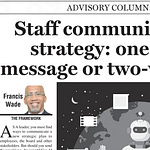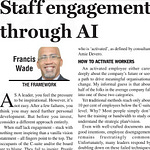As a member of the C-suite with a commitment to long-term success, you may find yourself at odds with the culture around you.
You’ve come to realize that your role has subtly but fundamentally shifted. While others are chasing quarterly numbers, you’ve begun to see your job through a different lens: one of legacy-building. You’re being pulled into the future, tasked—whether formally or not—with the responsibility of stewarding the organisation across decades, not just financial years.
But here’s the challenge: how do you bring others along with you? How do you persuade a board of directors, fellow executives, investors, and employees to prioritize the long game in a world of short-term incentives?
This is not an easy undertaking. In fact, changing how leaders think about strategy is one of the most difficult challenges in any organisation—especially successful ones.
The Resistance You’ll Meet
Take a step back. The leaders around you didn’t get to the top by being slow or visionary. They were rewarded—often repeatedly—for producing immediate results. Many of them built careers by tackling crises, hitting aggressive targets, and outpacing competitors. To them, leadership is synonymous with rapid action and tangible wins.
So when you start talking about “the next decade” instead of “the next quarter,” expect to encounter skepticism—or worse, indifference. You’ll find yourself talking about long-term transformation to people whose reputations, bonuses, and egos are anchored in the short term.
Yet your instincts tell you that this moment demands something different. You’ve seen what happens to companies that delay the future. Think Netflix versus Blockbuster. Apple’s iPhone versus Nokia and Blackberry. You understand that anticipating and shaping what’s next is no longer optional—it’s essential for survival.
When the Future Becomes Your Responsibility
The strange thing is, you probably didn’t sign up for this. Most executives aren’t formally tasked with long-range planning. You may not have a title like “Chief Vision Officer” or “Head of Strategic Futures.” But somewhere along the line, the burden of long-term thinking has landed on your shoulders. You are the unofficial guardian of the future.
And while some rise to the challenge, others freeze. Some feel paralysed, unsure of how to move forward without formal authority or clarity. Others rationalize their inaction: “The world is changing too fast,” they say. “We need to stay agile, not idealistic.” Or, “We can’t focus on tomorrow when we’re struggling to meet payroll today.”
Those may sound like pragmatic statements—but left unchallenged, they become excuses that entrench short-termism and degrade strategic clarity.
You Might Be a Liability
Here’s a difficult truth: if you’ve seen the need for long-term strategy and choose not to act on it, you may be doing more harm than good.
Executives often see promotions as rewards for past performance. Some become preoccupied with proving they belong in the role. Others fall into the trap of “Imposter Syndrome,” second-guessing their right to think differently or challenge existing paradigms. And many double down on what worked in the past: more short-term execution, more urgency, more firefighting.
But that’s not what your organisation needs from you now.
Remember Kodak? At its height, it was a global juggernaut. But a failure to confront long-term realities cost it over US$31 billion in value and 128,000 jobs. The signs were there. What was missing was leadership willing to act on them.
Persuasion as a Strategic Skill
If you’re waiting to take a course or attend a strategy retreat before acting, think again. The pace of change means you can’t afford to disappear for even a day without consequence.
Instead, see persuasion itself as a mode of learning. Every time you initiate a courageous conversation with a colleague about the future, you sharpen your understanding. Use questions like:
“What’s the long-term impact of this decision?”
“What systemic issues are we failing to address?”
“What future trends are we not discussing?”
“What goals would inspire our stakeholders ten years from now?”
“Which breakthroughs are we ignoring because they don’t pay off this quarter?”
These questions are disarming. They don’t require formal authority. But they do require courage.
You’ll need to tailor your approach to your context—whether you’re in a multinational corporation, a government ministry, a non-profit, an educational institution, or a startup. The principles remain the same: be the voice of long-term thinking in rooms dominated by short-term pressure.
Building Fluency, Not Just Faith
You may wonder whether it’s enough to just champion long-termism and let your enthusiasm carry the message.
Unfortunately, no.
If you’re not fluent in the arguments and counterarguments, you’ll be vulnerable to professional naysayers—those who use sophisticated logic to resist change. They’re often well-respected, experienced, and deeply invested in the status quo. Without preparation, they will derail your meetings, stall your initiatives, and seed doubt in others.
So don’t stop at intuition. Build expertise. Study long-term successes and failures. Read case studies. Watch YouTube documentaries. Analyze how visionaries like Steve Jobs, Satya Nadella, or Zohran Mamdani frame the future in specific, compelling language. Study the language of leaders who inspire action across timeframes.
Becoming fluent allows you to do more than make a good point—it allows you to win the room.
Final Thought
No one is born with the ability to shift other minds from a focus on “this quarter” to “this decade.” It’s not a natural skill—it’s a deliberate one. But if you cultivate it, refine it, and use it consistently, you’ll help your organisation navigate the future with intention instead of reaction.
Otherwise, you risk remaining a hostage—trapped by the logic of short-term thinkers and the inertia of yesterday’s success.
Start the practice today. The future is waiting for your leadership.
This article was rewritten based on an earlier Jamaica Gleaner column.












